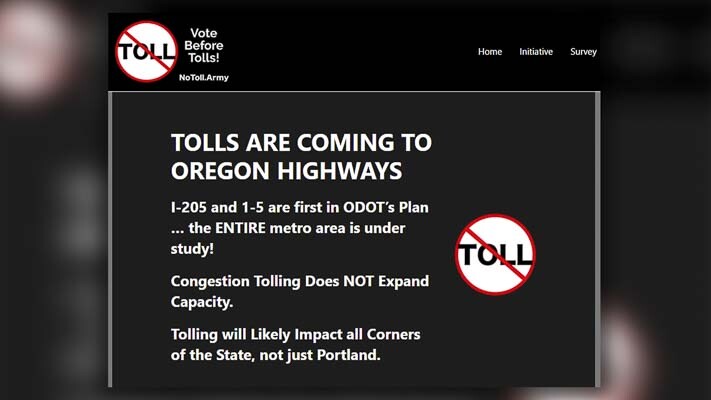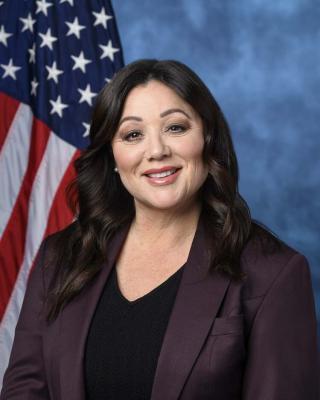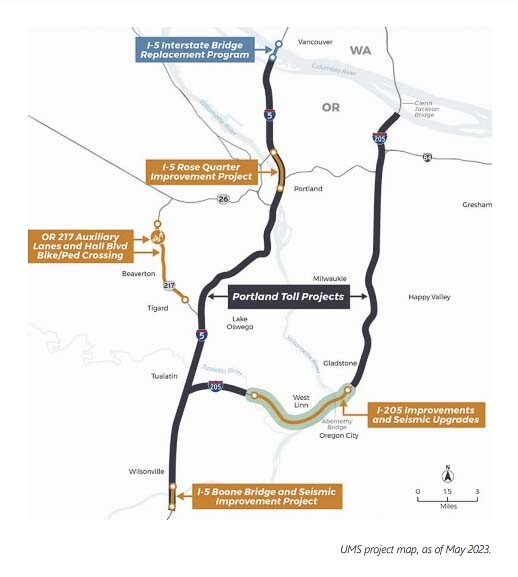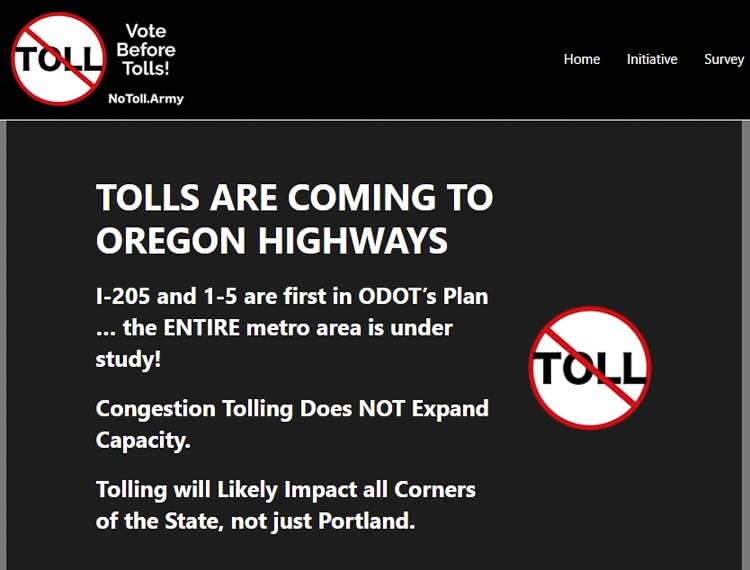
Congestion pricing tolls could be over $30 a day for Clark County workers
John Ley
for Clark County Today
Federal law generally prohibits tolling existing lanes on an interstate freeway, unless new lanes or bridges on the interstate are being added. Oregon has an “exception” which Congress authorized a few years ago. Currently, Oregon is looking to implement several different types of tolling on Portland-area freeways, including a ‘per mile” charge as part of a congestion pricing scheme.
Clark County has over 75,000 citizens who earn a paycheck in Oregon. The bridge tolls and especially the per mile tolls would be financially devastating to thousands of Southwest Washington residents. Economist Joe Cortright has estimated the combined tolls could be as much as $28 to $31 a day for round trip travel from Vancouver to Wilsonville.
Congresswoman Lori Chavez-DeRemer (OR-05) is listening to her constituents and is introducing legislation to prohibit tolling on I-5 and I-205 in Oregon. The No Tolls on Oregon Roads Act would rescind federal tolling authority granted to states specifically on Interstate 5 and Interstate 205 in Oregon. As a result, the legislation would prevent the Oregon Department of Transportation (ODOT) from proceeding with any tolling projects along these two roadways – effectively blocking tolling from being implemented along these interstate highways in Oregon.

“Oregonians are understandably fed up with the state’s attempt to hastily implement tolling, and I want to give drivers peace of mind by making the current ‘pause’ permanent,” Chavez-DeRemer said. “By blocking tolling along I-5 and I-205, my No Tolls on Oregon Roads Act would protect our communities from traffic congestion, save families from paying a regressive tax, and support businesses by keeping transportation costs lower. As a member of the Transportation and Infrastructure Committee’s Highways and Transit Subcommittee, I’ll continue working closely with my colleagues to put a stop to this unfair interstate tax.”
Joe Kent, a candidate in Washington’s Third Congressional District, praised the effort.
“Excellent leadership by Rep. Lori Chavez-DeRemer. I will gladly co-sponsor this legislation.” Kent said federal taxpayer dollars shouldn’t be used to further tax the people of Washington and Oregon, or inhibit interstate commerce.
The congresswoman made an appearance on the Lars Larson radio show Wednesday.
“We’ve been hearing about it for years. People are frustrated and it was time to step in and do something where people have said we need help.” She spoke about people feeling their input has been ignored by ODOT. “I wanted to introduce the bill that will kill tolling on the roads in Oregon, specifically to I-205 and I-5,” she said..
The No Tolls on Oregon Roads Act prohibits the use of federal funds for tolling on I-5 and I-205 and prohibits the U.S. Department of Transportation (USDOT) from approving I-5 and I-205 tolling projects.
“This is ODOT and the FHA, who have worked together to get this bypass, for them to authorize a way to collect tolls on Oregon drivers,” she said. “It simply is another path that ‘s going to be a regressive tax.”
Larson mentioned that the “cost of collection” can be 50 percent of the money collected. In Seattle on I-405, the cost of collection was 43 percent before the pandemic and 68 percent in 2021. The gas tax has under 1 percent collection costs.

In 2018, ODOT’s “Value Pricing Policy Advisory Committee” revealed that if tolling were implemented on all Portland area freeways, 130,000 vehicles would be diverted onto side roads and into neighborhoods. On Boreland road, east of Stafford road, ODOT predicted a 100 percent increase in traffic due to the tolls. In West Linn, one alternative showed a 90-100 percent increase.
“You’re actually going to make things worse,” said Canby City Council President Tim Dale five years ago. He reminded the ODOT presenters, “it doesn’t take a rocket scientist to know that to reduce congestion on I-205, you need more lanes.”
Prior to recently pausing the second phase of the I-205 project, ODOT officials told the community that adding a new lane in each direction for a 7-mile section would reduce traffic congestion from 14 hours to just two hours a day. Adding capacity works.
ODOT officials admit their biggest concern is traffic diversion. In their presentation regarding I-205 tolling they stated: “Perhaps the largest single concern in evaluating alternatives, is the effect on roadways in the vicinity of I-205 tolling due to local rerouting.”.
Clackamas County Commissioner Paul Savas was one of the 25 Value Pricing committee members. He pushed back at the time, complaining that the option that delivered the most congestion relief was not being advanced.
“There was an option that’s not being considered,’’ Savas said. “Option four, which was to build a lane on both I-5 and I-205. That was discounted and then not moving forward; not by decision to this group but by decision of the process. That clearly relieved congestion more than any other alternative, judging by the scale of grading. I think it begs the question, if we had the most ideal congestion relief project of all not moving forward, then what is the purpose of the revenue.“
“Most Oregonians bristle at the idea of tolling,” says Oregon Rep. Werner Reschke (Republican, Klamath Falls). “The permission for the government to begin tolling our highways was passed by the legislature in 2017.”
One response was citizens creating IP-4. The citizen initiative would guarantee people a vote before tolls could be put on any Oregon road. Initiative backs hope to collect 200,000 signatures by the end of June 2024.
“Now ODOT wants to toll portions of I-205 and I-5, not necessarily to raise funds to build more lanes but to discourage travel during certain hours of the day,” Reschke said. “Under this system it would cost more to travel the same stretch of highway during rush hour and less at 4:00 am. The Democrat-led approach to traffic is the same as many of their other solutions to key problems: limit demand through increased taxation and regulation.”
Reschke’s solution is to add new vehicle lanes. Increasing supply rather than restricting demand. It’s been over 40 years since new vehicle capacity was added to the Portland metro area. Interstate 205 opened in December 1982, including the Glenn Jackson Bridge.

Tolling is considered by many to be a largely inefficient way to collect funds for transportation. The Washington state tolling system has five separate tolled facilities. The entire tolling system had to be bailed out with General Fund taxes for the past three years because they failed to collect enough tolls to cover the cost of collection and pay back Wall Street bond holders.
Congress is currently on its summer recess. The House will resume deliberations on Sept. 12.
Recently, Chavez-DeRemer also introduced the Tolling Transparency Act, which would require the U.S. Department of Transportation (USDOT) to conduct an Economic Impact Study for any major tolling project and prevent the implementation of tolling until the study is complete. She also wrote to Federal Highway Administration (FHWA) Administrator Shailen Bhatt raising concerns that Oregon’s tolling proposal was out of compliance with federal law. Following the letter, Chavez-DeRemer and Bhatt held a call to discuss the impact the proposal could have on Oregon communities.
Also read:
- Opinion: Hiding the growing cost of the Interstate Bridge replacementJoe Cortright of the City Observatory addresses the rising cost of the Interstate 5 Bridge replacement project.
- 90 minutes of delay on Southbound I-5 in Southwest Washington on Friday afternoon, July 26Travelers using southbound Interstate 5 through Woodland should expect up to 90 minutes of delay during Friday afternoon and evening and should delay travel or prepare for additional travel time.
- Nighttime paving work on I-5 and SR 14 in Clark County July 28-Aug. 9Nighttime travelers in Clark County should expect delays for maintenance and paving work beginning Sunday, July 28 until the morning of Friday, Aug. 9.
- Northeast 182nd Avenue/Northeast Ward Road to be closed on Aug. 1Northeast 182nd Avenue and Northeast 172nd Avenue in Clark County will have single-day closures on August 1 and August 5 for road preservation, with detours in place.
- Interstate Bridge Replacement program awarded $1.499 billion FHWA Bridge Investment Program grantInterstate Bridge Replacement program officials have shared that the program received $1.499 billion through the Federal Highway Administration’s Bridge Investment Program.









